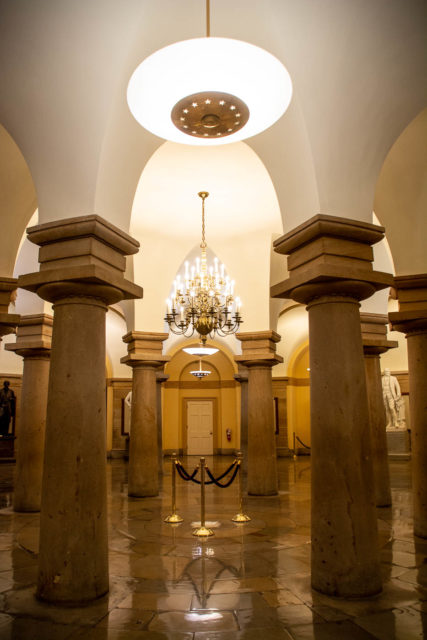An event like the U.S. Capitol riots requires more than just criticism – it requires reflection and confronting some uncomfortable truths.
On Jan. 6, thousands of extremists flaunting Trump gear and Confederate flags stormed the U.S. Capitol as Congress prepared to confirm Joe Biden’s presidency. They vandalized one of the country’s most important buildings and attempted to follow through on death threats to prominent members of Congress and even former Vice President Mike Pence, all in the name of baseless conspiracies.
Amid the chaos, Biden, among many politicians, rightfully denounced the insurrectionists. He also stated that “the scenes of chaos at the Capitol do not represent a true America.”
But this couldn’t be more false, and this rhetoric is half the reason why.
Furthering the myth of American exceptionalism is dangerous because it willfully neglects America’s bloody past and minimizes the struggles marginalized communities have endured. UCLA students and educators have the responsibility to address these issues and acknowledge history in its entirety – bereft of whitewashed, watered-down teachings.
Acknowledging our country’s shortcomings does not make us any less patriotic. In fact, it makes us more so.
Gabriel Ordonez, a second-year molecular, cell, and developmental biology student, faulted the nation’s systemic issues for the insurrection.
“I felt disappointed, ashamed and just quite saddened by the fact that our Capitol, a temple of democracy, was being easily raided, not (from outside) but from within,” Ordonez said. “It goes to show a culmination of several decades upon decades of systemic racism, misinformation campaigns and everything under that umbrella that came to this point.”
In order to make progress as a country, we first must recognize how the assault on the Capitol was a product of America’s past. After all, the events of Jan. 6 were no anomaly in American history.
There are far too many instances where white violence threatened democracy, from the physical violence of the Red Summer of 1919, when white mobs instigated deadly race riots, to the structural violence of poll taxes, literacy tests and grandfather clauses that suppressed Black Americans’ right to vote for decades.
And we saw it this year as former President Donald Trump falsely maintained that voting fraud ran rampant in majority-Black cities, redolent of Black Americans’ disenfranchisement in the post-Reconstruction era.
Adam Bakr, a teaching assistant for the course Cluster 60: “America in Sixties” and a graduate student studying political science, said the 1921 Tulsa Race Massacre on Black Wall Street was eerily reminiscent of what happened at the Capitol.
During the Tulsa Race Massacre, a white mob attempted to break into the nearby National Guard armory and attacked homes and businesses in a predominantly Black neighborhood, while the police remained complicit with their violence, leaving approximately 300 people dead and the majority of Tulsa’s Black population homeless.
“There was a moment in history where people of color started to (gain socioeconomic status),” Bakr said. “And so white folks started to fear that, because they don’t know what the country is going to look like if people of color are actually able to attain the same status that white folks have always had in America.”
So to say the insurrection was not reflective of a “true America” when only 100 years ago a massacre egged on by white supremacists took place is not only inaccurate but also harmful.
Politicians perpetrated this same facade of innocence in the aftermath of the Capitol riots. Republicans and Democrats alike made multiple statements claiming the event wasn’t reflective of America’s true values.
We cannot discuss the assault on our nation’s Capitol without reflecting on historical grievances. Suppressing our nation’s gravest injustices in an attempt to separate ourselves from racial guilt causes history to repeat itself, and the assault on the Capitol proves it.
Annalyn Diaz, a third-year human biology and society student, said the insurrection exemplifies the nation’s hypocrisies.
“I am frustrated with the hypocrisy of the way our nation has been handling situations like (the Capitol insurrection),” Diaz said. “It’s plain and clear to see how white supremacists can get away with ridiculous feats when Black people have been killed for much less.”
As UCLA students and educators, we must do our part to understand and address America’s shortcomings, so we can work toward a more equitable future.
Bakr proposed a solution for confronting this issue here at UCLA: engaging in educational conversations, even when we disagree.
“But what’s even more important than just engaging is active listening,” Bakr said. “In those conversations, I’ve learned a ton, not just about what people think but also about people’s experiences that I never personally had. It allows me to better understand why they hold these perspectives and viewpoints.”
By failing to acknowledge our violent history and the consequences it has on historically marginalized communities, we will only exacerbate the partisan divide, putting us further from achieving true change.
Some may believe that conversations pointing out America’s flaws are counterproductive or downright unpatriotic, but we cannot mistake blind nationalism for patriotism.
UCLA students and educators must hold our politicians responsible for unlearning American innocence by teaching history holistically. Bringing attention to our failures is how we can ensure they never happen again; it’s an act of true patriotism.
Clearly, our words matter. When we use rhetoric that deflects American actions as unreflective of a “true America,” we displace responsibility for our systemic issues.
And when we knowingly do that, we all pay the cost.

